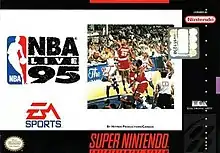NBA Live 95
NBA Live 95 is the follow-up to NBA Showdown, and the first NBA Live title in the NBA Live video games series from EA Sports. The cover featured an action shot from the 1994 NBA Finals. The game was published by EA Sports and released in October 1994.
| NBA Live 95 | |
|---|---|
 Cover featuring 1994 NBA Finals | |
| Developer(s) | Hitmen Productions |
| Publisher(s) | EA Sports |
| Composer(s) | Traz Damji |
| Series | NBA Live |
| Platform(s) | MS-DOS, Genesis, Super NES |
| Release | Super NES Genesis DOS
|
| Genre(s) | Traditional basketball simulation |
| Mode(s) | Single-player, Multiplayer |
It introduced many elements that would become standard in the series, including the isometric on-court perspective, the "T-meter" for shooting free throws and the turbo button used to give players a temporary burst of speed. The game's engine came from a modified version of the engine used in EA Sports' FIFA International Soccer game, using the same perspective. The game was re-released with NBA Live 06 as part of the EA Retro Series. Game Players gave the Super NES version of this video game its "best sports game award" in their Super NES division on the January 1995 issue of their magazine.[1]
The game was the first Official NBA simulation to introduce the ability to create customized fictional teams and create copies of existing players, as well as a Create-a-Player function for users to make themselves in the game. It is also notable for being the first NBA video game to not feature Charles Barkley, as he began holding out on signing a licensing agreement due to the lack of pay to retired players from the NBAPA.[2][3]
NBA Live 95 was followed by NBA Live 96.
Version differences
The SNES version of the game featured the 1993-94 NBA rosters, while the Genesis version of the game featured the up-to-date 1994-95 rosters (minus most of the year's rookie class). Both versions featured limited roster management functions, however in the Genesis version, only players in the starting lineup could be traded. Additionally, there was no Create-a-Player function or a Free Agent pool to draw from.
The PC release featured updated rosters accurate as of the 1994–95 season's trade deadline, and included the entire rookie class of 1994.
Reception
GamePro wrote of the SNES version that it "improves on last year's NBA Showdown with better graphics, more in-depth strategy, and more realistic game play." They particularly praised the game's 30-degree-overhead court view, saying it allows players a better view of the action while allowing the game to run more smoothly.[4] In February 1995, Famitsu magazine's Reader Cross Review gave the Super Famicom version of the game an 8 out of 10.[5]
GamePro also gave the Genesis version a generally positive review, though they commented that the cooperative multiplayer tends to be confusing. This time they made particular note of the fact that players take command of basketball players, coaches, and general managers, saying that this adds variety and depth to the gameplay.[6]
Next Generation reviewed the SNES version of the game, rating it five stars out of five, and stated that "Live '95 emerges as the best basketball sim' available."[7]
In 1996, Computer Gaming World declared the original NBA Live the 57th-best computer game ever released.[8]
The game is also notable for its success helping launch EA's other sports games. Both Madden NFL '95 and Triple Play Baseball outsold their competitors, NFL '95 and World Series Baseball, respectively, for the first time following NBA Live's release.[9]
References
- Game Players. January 1995.
- "NBA Live 95 is the Greatest Basketball Video Game of All-Time". NBA.com.
- "Charles Barkley will not appear in 'NBA 2K' unless game publisher pays NBPA". Sporting News.
- "NBA Live Jams to the Top". GamePro (65). IDG. December 1994. p. 186.
- 読者クロスレビュー - NBA LIVE '95. Weekly Famitsu. No.323. Pg.39. 24 February 1995.
- "Hoop it Up with NBA Live '95". GamePro (66). IDG. January 1995. p. 116.
- "Finals". Next Generation. No. 1. Imagine Media. January 1995. p. 104.
- Staff (November 1996). "150 Best (and 50 Worst) Games of All Time". Computer Gaming World (148): 63–65, 68, 72, 74, 76, 78, 80, 84, 88, 90, 94, 98.
- "NLI Research Video Game Sales". NLI Research Journal.